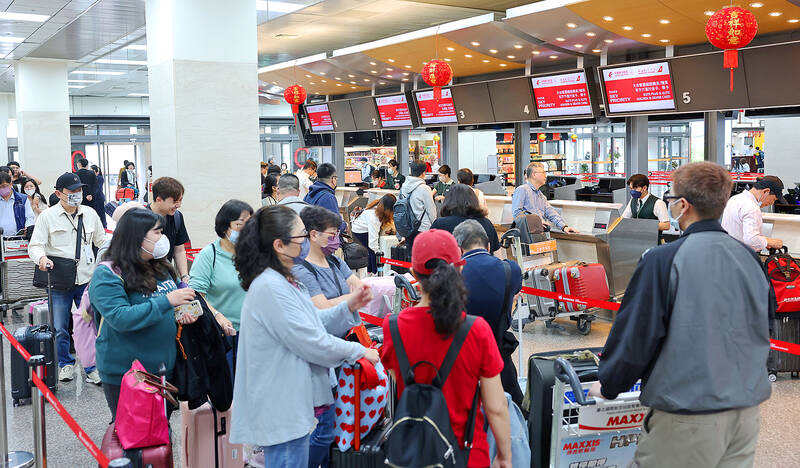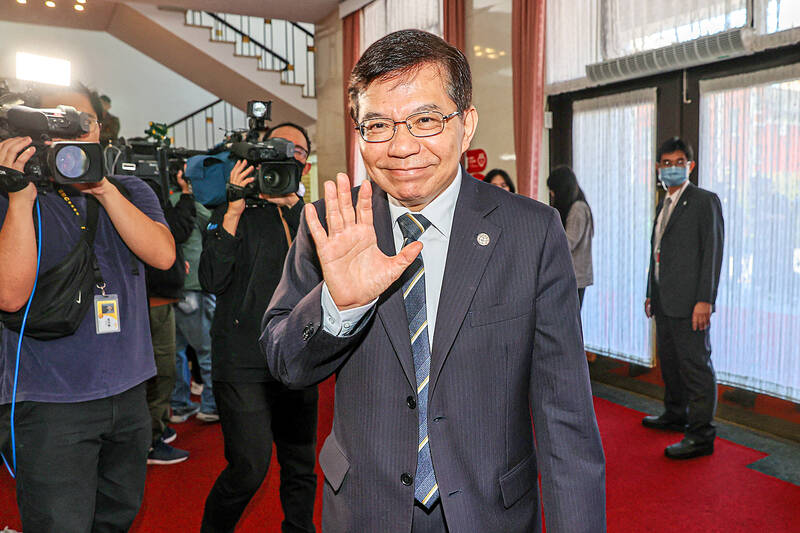The government could consider resuming group tours to China if Beijing is willing to show goodwill on the matter by June 1, Minister of Transportation and Communications Wang Kwo-tsai (王國材) said yesterday.
Wang defended the government’s decision to suspend cross-strait group tourism, which is to take effect on June 1, when interviewed by reporters before attending a plenary session of the legislature.
He reiterated the position on the Yahoo TV talk show Meta Sense (齊有此理).

Photo: CNA
“Taiwan and China had been in gridlock for some time in terms of tourism issues. In August last year, Taiwan expressed goodwill by first announcing that cross-strait tours would resume, although there were no similar indications from China then,” Wang said.
“Following the announcement, we met with Taiwanese tour operators in November and set the date to resume cross-strait tours on March 1, provided that China reciprocate with goodwill,” he said.
After the presidential and legislative elections on Jan. 13, Beijing sought to have Nauru sever diplomatic ties with Taiwan, which it did two days later, he said.

Photo: CNA
This was followed by China unilaterally changing the M503 flight route at the end of last month, he said.
Both moves would affect Taiwan’s aviation safety and national security, he added.
Given the series of hostile gestures from China, the government would be subject to greater public censure if it had resumed cross-strait group tours as planned, he said.
The government’s final decision was that tour groups to China that are scheduled to leave between Friday next week and May 31 can continue as planned, and tours set to leave in June can be merged with those taking off from next month to May, Wang said.
“We did what we had promised tour operators. However, unless there is a show of goodwill and a change in attitude, group tours to China would still be suspended from June 1,” he said.
Regarding what would constitute “goodwill” from China, he said that would depend on Beijing’s actions.
“We will see how China behaves before June 1, whether it shows goodwill by allowing Chinese tour groups to visit Taiwan, and whether it has restrained itself from breaching and disrespecting Taiwan’s sovereignty, particularly with regard to the M503 aviation route,” he said.
“We are willing to review our policy if the goodwill is received by June 1, or group tours to China would continue to be banned,” he added.
In 2019, 2.3 million Taiwanese tourists visited China, while 1.8 million Chinese tourists visited Taiwan, Wang said.
Chinese tourists spent NT$77 billion (US$2.45 billion) traveling in Taiwan, while Taiwanese spent about NT$80 billion in China, he said.
Based on those figures, Taiwan would incur a deficit of NT$80 billion in tourism revenue if Taiwanese group tourists are allowed to visit China, while Chinese group tourists are not allowed to come to Taiwan, he said.
Wang also defended the use of Article 53 of the Act for the Development of Tourism (發展觀光條例) to penalize tour operators that contravene the ban on group tours to China.
The article stipulates that operators of hotels, tours, tourist amusement enterprises or home-stay facilities who tarnish national dignity, harm national interests, contravene good morals or defraud tourists can be fined NT$30,000 to NT$150,000.
In cases of serious offenses, the operators can be fined NT$150,000 to NT$500,000 and their businesses partly or completely closed for a fixed period. Their operating licenses or registration certificates could also be revoked.
The Tourism Administration would help tour operators recover deposits paid to airlines if they have trouble merging tour groups in compliance with the change in policy, Wang said, adding that the ministry is considering changing the traffic point system to appease professional drivers and to address abuse of the system.
“The purpose of the point system is to punish repeat offenders. However, we are considering not giving points to drivers whose fines are less than NT$1,200,” he said. “We would only review reports of traffic infractions from the public if the offenses endanger public safety and must be proved in a three-minute video. Drivers whose offenses are reported by whistle-blowers might not receive a point for breaches of traffic regulations.”

MAKING WAVES: China’s maritime militia could become a nontraditional threat in war, clogging up shipping lanes to prevent US or Japanese intervention, a report said About 1,900 Chinese ships flying flags of convenience and fishing vessels that participated in China’s military exercises around Taiwan last month and in January last year have been listed for monitoring, Coast Guard Administration (CGA) Deputy Director-General Hsieh Ching-chin (謝慶欽) said yesterday. Following amendments to the Commercial Port Act (商港法) and the Law of Ships (船舶法) last month, the CGA can designate possible berthing areas or deny ports of call for vessels suspected of loitering around areas where undersea cables can be accessed, Oceans Affairs Council Minister Kuan Bi-ling (管碧玲) said. The list of suspected ships, originally 300, had risen to about

DAREDEVIL: Honnold said it had always been a dream of his to climb Taipei 101, while a Netflix producer said the skyscraper was ‘a real icon of this country’ US climber Alex Honnold yesterday took on Taiwan’s tallest building, becoming the first person to scale Taipei 101 without a rope, harness or safety net. Hundreds of spectators gathered at the base of the 101-story skyscraper to watch Honnold, 40, embark on his daredevil feat, which was also broadcast live on Netflix. Dressed in a red T-shirt and yellow custom-made climbing shoes, Honnold swiftly moved up the southeast face of the glass and steel building. At one point, he stepped onto a platform midway up to wave down at fans and onlookers who were taking photos. People watching from inside

Japan’s strategic alliance with the US would collapse if Tokyo were to turn away from a conflict in Taiwan, Japanese Prime Minister Sanae Takaichi said yesterday, but distanced herself from previous comments that suggested a possible military response in such an event. Takaichi expressed her latest views on a nationally broadcast TV program late on Monday, where an opposition party leader criticized her for igniting tensions with China with the earlier remarks. Ties between Japan and China have sunk to the worst level in years after Takaichi said in November that a hypothetical Chinese attack on Taiwan could bring about a Japanese

STREAMLINED: The dedicated funding would allow the US to transfer equipment to Taiwan when needed and order upgraded replacements for stockpiles, a source said The US House of Representatives on Thursday passed a defense appropriations bill totaling US$838.7 billion, of which US$1 billion is to be allocated to reinforcing security cooperation with Taiwan and US$150 million to replace defense articles provided to the nation. These are part of the Consolidated Appropriation Act, which the US House yesterday passed with 341 votes in favor and 88 against. The act must be passed by the US Senate before Friday next week to avoid another government shutdown. The US House Committee on Appropriations on Monday unveiled the act, saying that it allocates US$1 billion for the Taiwan Security Cooperation Initiative